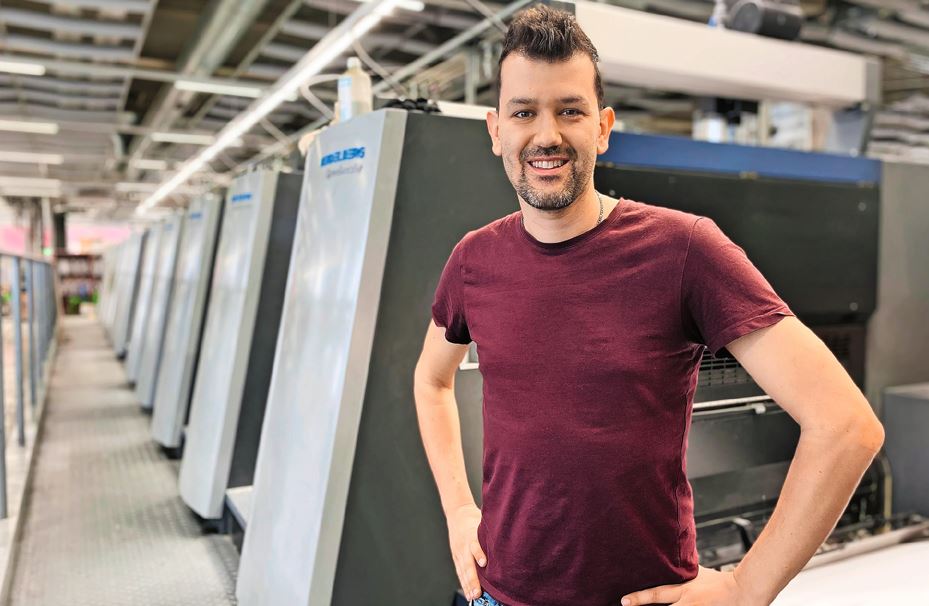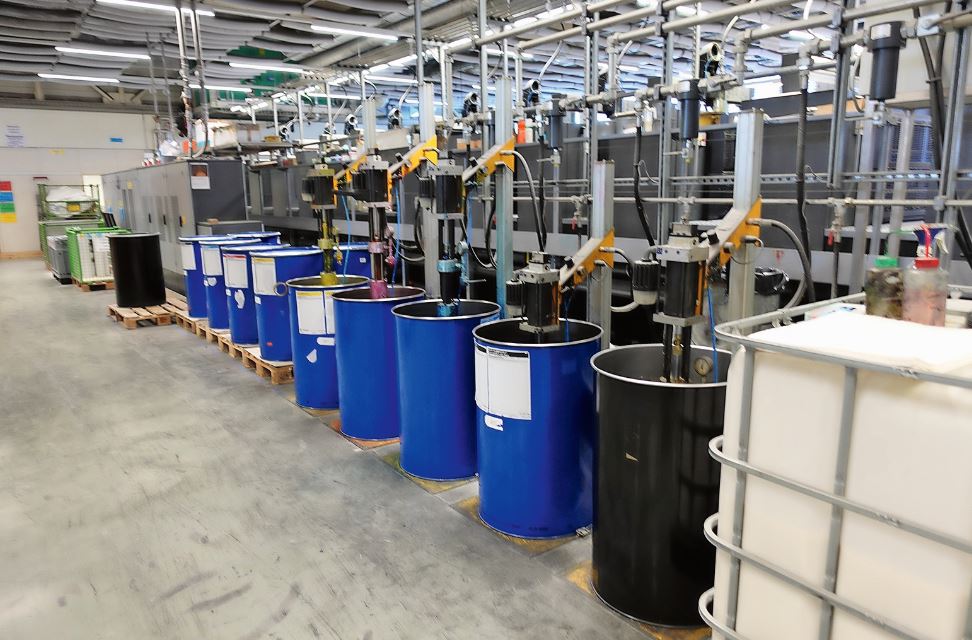"When you have less to do, more mistakes happen".
Galledia Group AG, which also publishes the trade magazine SAFETY-PLUS, is the largest independent media company in Eastern Switzerland. Its production sites include one of the most modern sheet-fed offset printing plants based in Flawil. As Safety Officer (SiBe), Pascal Strässle is responsible for occupational safety.

Mr. Strässle, what were the most frequent industrial accidents last year?
Most accidents occur due to carelessness. They are usually typical accident incidents such as tripping and slipping. Last year we had one accident - resulting in a broken wrist, caused by careless walking backwards near the saddle stitcher. On one occasion, a person fell while climbing a flight of stairs and failed to support themselves on the hand knob. What also happens frequently in our company are finger injuries while tying or untying pallets.
Were there also so-called "near-accidents" here and there?
Suva is actually very satisfied every time during the plant tours. There was a near-accident once when an employee disposed of the cut plastic straps of a pallet in the trash container: The tight straps popped open again and the employee injured his eye, but was lucky not to lose his sight. A few millimeters in another place and he would have gone blind in one eye. Since then, we have taken appropriate precautions to always tape the dangerous tapes together when disposing of them in the future. As a result, our employees have been instructed to cut open the pallets in future - at a right angle to the barrier tape - so that the elastic tapes cannot burst open in front of the employee, but only next to him. During the actual inspections, usually only something small is found.
How are the heavy loads (printing plates, printed sheets, print products) moved?
When the stacks of paper need to be turned, we have an electric pile turner to lift and turn the load. For the transport from A to B we have lift trucks. For manual work we have electric pallet trucks, which transport pallets to the desired working height.
What is a typical working day like for a safety officer at Galledia in Flawil?
I perform my duties as a safety officer in addition to my normal 100 percent workload as a prepress employee. Once a month, I have to go on a major tour: This involves the production rooms, the chemistry room and all emergency exits, as well as the defibrillator. I also constantly check all the corridors and the first-aid kits.
Machine incidents such as sudden trickling of liquids are usually reported anyway. But there are many other safety aspects to consider. Pallets, for example, must never be stacked all the way up, even though LED lights are used on the ceiling. Special precautions are also required for external assembly work. For example, a welder must not weld on Fridays, as a fire can ignite over the weekend.

Anyone who joins us as a new employee is personally trained by me on the very first day. I guide the person through all emergency exits and explain the procedure in the event of a fire alarm.
I am also responsible for training and measures relating to occupational safety and hygiene. The measures for corona pool tests, for example, came from the management. However, the actual organization of the saliva tests took several days. When a pool test shows positive results, there are usually many unexpected administrative tasks.
Several tons of paper are stored at the Flawil site. What special challenges arise for fire protection?
All paper deliveries come to us "just in time": everything that arrives on one day is also processed on the same day. We have about 15 tons stored in the cellar. The daily rations for magazines amount to about 20 tons. In the event of a fire alarm, a large fire department is always called out.
Our fire detection systems have highly sensitive heat and odor sensors. The most dangerous part of our substances is stored in the chemical room, which will soon have its own fire door and be equipped with a code access system. In terms of chemicals for the machines, we only store what we actually need. An additional chemical storage cabinet in the production hall will last 90 minutes in the event of a fire before the fire department would intervene.
What protective equipment must employees wear on site? Is noise protection required in certain areas?
All our employees in production wear safety shoes and have personalized ear protection (an impression of the auditory canal was made of each ear), protective goggles are available at the locations where the chemicals are tied and filled. Our employees use plastic gloves for cleaning with chemicals, respiratory protection is not required. Protective goggles are available for filling so that no splashes get into the eye. If this should happen, we have hung up an eye shower for washing out.

Have any emergencies occurred in recent years?
Once, a battery exploded in a small floor cleaning machine. After that, the fire department ventilated the production hall with large fans. Fortunately, we have not yet had a real fire. Only once, eight years ago, a sheet of paper caught fire near a UV lamp. However, we were able to extinguish the fire immediately. However, the fire department still moved in. How is the Evak team organized in the event of a fire incident? An alarm usually means "continue working normally" in our company. We have different evacuation and deputy evacuation officers for each floor and department. They have their own emergency bags with green vests. In case of an emergency, they mark which floors may no longer be entered in the event of a fire.
In the event of an alarm, the Evak team arrives at the reception desk. The fire alarm system shows the location of the alleged fire. This is visited and checked and it is evaluated whether it is a fire or not. If there is a fire, the manual button is pressed. If a second alarm sounds, our evac team reaches for their handbags and all persons leave the respective floors. For this reason, we also keep an entry list at the reception desk, so that in the event of a fire, it is ensured that all persons, whether visitors or employees, leave our building immediately.
How are the necessary employees for an Evak team evaluated?
There is a kind of "collection box" of trained employees. The basic rule is: even if the biggest customer is visiting us and our CEO has a concern at the moment, the Evak team takes the lead on safety precautions in an emergency. We have also had false alarms during evacuation, but it really works very well and quickly for us. Handling a fire extinguisher may be unfamiliar to certain people in an emergency.So far, we have held an authentic fire extinguishing course every two years. In live scenarios, for example, cans were blown up and the reaction behavior was demonstrated when hot oil was supposedly extinguished with water. The handling of different fire extinguishers was also practiced.
Two hours of this were also allowed to count towards working time. However, the feedback was very good from all participants. A first aid course was held by the nearby Samaritan Association. This also included a defibrillator crash course and live practice scenarios in the pressroom, which were acted out. A simulation with dummies and wax blood was particularly authentic. One customer who visited us during the exercises and knew nothing about our exercise scenarios was a little taken aback at the moment when someone screamed loudly (grin).
What particular challenges did you face during the pandemic?
If you have less to do, a lot more mistakes happen. We also noticed this last year during the short-time working period. What was particularly challenging was regularly "keeping ourselves informed" about the applicable federal regulations. One issue that always puts pressure on us is maintaining production in the event of failures. If we always sent three to four of our printers home in the event of negative pool tests, things would quickly get tight at the Flawil site.









